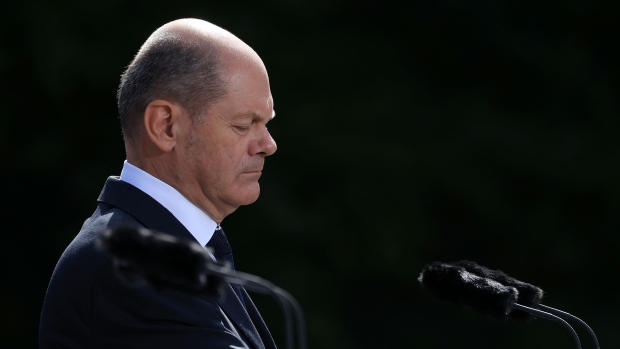Oct 20, 2022
Energy Crisis Debate Clips the Wings of Europe’s Fiscal Hawks
, Bloomberg News

(Bloomberg) -- Is the once unthinkable about to become the European Union’s new normal?
When EU leaders meet in Brussels Thursday to try to solve an energy crisis that threatens the livelihood and security of its 500 million citizens, they’ll look to lessons learned during the Covid-19 pandemic. Among them is the bloc’s decision to break one of its biggest taboos by mutualizing debt in a massive transfer of wealth from the EU’s wealthiest countries to those most in need.
While the bloc’s fiscal hawks are against a repeat of that groundbreaking €724 billion ($707 billion) recovery fund, some, including Germany, are willing to back the issuance of joint debt to disburse loans to prop up struggling economies. The change of heart underscores the severity of the bloc’s situation as well as the acceptance that the EU’s common funding streams aren’t sufficient to deal with the scope of current shocks.
“This crisis is calling for common action,” said Maria Demertzis, deputy director at Bruegel, a Brussels-based think tank, referring to the loan-based SURE instrument the EU used during the pandemic. “And when you have a tool that worked before it’s difficult not to use it again.”
Russia’s war in Ukraine has fueled inflation and brought Europe’s economies to the brink of recession, with Moscow’s drastic reduction in gas bound for Europe leaving the continent scrambling for alternative supplies. Before the summit ends on Friday, leaders want to have a concrete package of measures to mitigate the impact of high energy prices to stem the growing number of cost-of-living protests that have sprung up from Paris to Prague.
EU Solidarity
Olaf Scholz, the German chancellor, has reversed the country’s long-held opposition to the use of common borrowing to cushion the blow of the energy crisis, on one condition: that the fresh money should be disbursed as loans and not grants, Bloomberg reported earlier this month.
That U-Turn followed a raft of criticism from member states that Germany’s €200 billion plan to shield its national companies and households from high energy prices would reopen economic divisions in the bloc and cause irreparable damage to the level playing field the EU is committed to creating.
“If there is no consultation, no solidarity, no targeted support and no respect of fair competition conditions, we risk a fragmentation of the euro area,” French Finance Minister Bruno Le Maire warned at the time.
On the eve of the summit Ursula von der Leyen, president of the European Commission, the EU’s executive arm, confirmed that it’s working on options to raise additional funds to speed the energy transition to renewables and ensure a level playing field in the bloc. “We have to give every member state the same opportunity to prepare for the future,” von der Leyen told the European parliament. “This is not only about energy, this is about our global competitiveness and our sovereignty.”
New Tools
While the process is still in an early phase, joint borrowing is one of the options being explored by the commission, according to EU officials familiar with the discussions.
Countries including France, Italy and Portugal are planning to use the summit to push for the establishment of new EU tools, people familiar with the matter said. Luxembourg, the Netherlands and Denmark have cautioned against developing new common solutions, said the people, who spoke on condition of anonymity.
Austria, one of the traditional hawks, is open to talks about a SURE-style option as long as the support comes in the form of loans and not grants, but Vienna remains skeptical about the wisdom of repeating joint borrowing because of the impact it could have on the fiscal discipline. “I think the member states have to bring their budgets in line before, and they need some incentives for doing that,” Austrian Finance Minister Magnus Brunner told Bloomberg.
As so often, Germany will play the decisive role. After years of opposition to any mutualization of risks, Scholz, two years ago was in the driving seat of the coronavirus fund as finance minister, and is open to more joint debt to provide credits to other capitals with higher borrowing costs.
‘Step Forward’
The German chancellor rejected a call from his own finance ministry led by coalition partner Christian Lindner, to rule out a debt-financed EU program as part of Berlin’s negotiating position at the summit, according to a person familiar with the discussions. At the core of the talks is a re-run of the pandemic-era SURE instrument which used EU debt to provide loans to member states to help pay unemployment benefits.
Lindner, champion of fiscal rectitude, has said that he sees no reason to discuss this option at the moment. But still he would not block such a solution if the need later emerges, according to another person familiar with the discussions.
The German finance minister discussed the current crisis with the commissioner for economy Paolo Gentiloni the same night the Italian published an op-ed advocating the use of joint-guaranteed debt. The two spoke on the margins of the euro-area finance ministers meeting in Prague earlier this month.
Using an instrument like SURE “would represent a step forward,” said Breugel’s Demertzis, “but a bigger step would be if the joint borrowing was made to offer grants, the real innovation of the response to the covid crisis.”
--With assistance from Diederik Baazil, Marton Eder and Kamil Kowalcze.
©2022 Bloomberg L.P.







